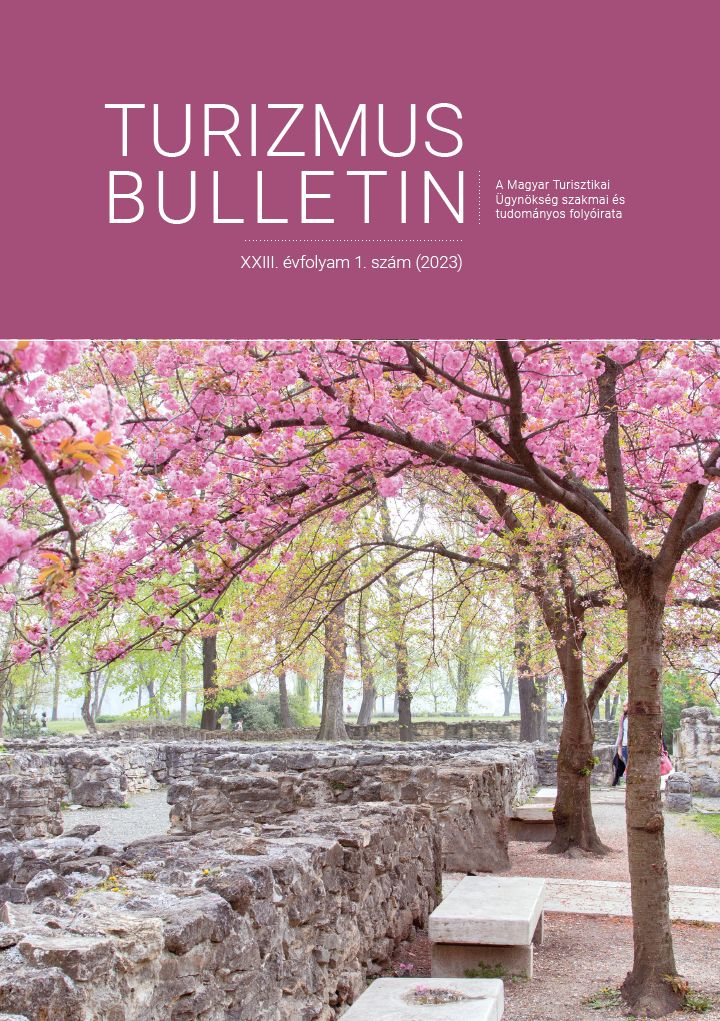The use of design methods as catalysts for innovation in hotels
DOI:
https://doi.org/10.14267/TURBULL.2023v23n1.3Keywords:
Design Thinking, Service Design, Service innovation, customer experience, hotel industryAbstract
The business environment is never stagnant, only the change is constant in it. Constant change occasionally results in uncertain market conditions, which force hotel companies to reconsider their business models, operational processes, products and services in order to adapt to the changing conditions. In response to changing consumer needs hotel companies adapt new practices, in most cases introducing technological or non-technological innovations. However, in the case of long-term operation it is not sufficient to meet guest expectations only: also local and global challenges are essential elements to be addressed in the accommodation market in line with the changing conditions. The aim of this paper is to illustrate the potential of Design Thinking and Service Design as innovation catalysts in the hotel industry.
References
BROWN, T. (2008): Design Thinking. Harvard Business Review. 86(6). pp. 84–92.
CLATWORTHY, S. (2014): How to Design Better Services. Arkitektur-og designhogskolen i. Oslo: Oslo.
CLATWORTHY, S. (2017): Service Design Thinking. Chapter 11. In: Lüders, M. – Andreassen, T. W. – Clatworthy, S. – Hillestad, T. (eds.): Innovating for Trust, Business Collection. pp. 167–182. https://doi.org/10.4337/9781785369483.00020
COOPER, R. – JUNGINGER, S. – LOCKWOOD, S. (2009): Design Thinking and Design Management: A Research and Practice Perspective. Design Management Institute: Review. 20(2). pp. 47–55. https://doi.org/10.1111/j.1948-7169.2009.00007.x
ELSBACH, K. D. – STIGLIANI, I. (2018): Design Thinking and Organizational Culture: A Review and Framework for Future Research. Journal of Management. 44(6). 2274–2306. https://doi.org/10.1177/0149206317744252
FÉKI ZS. – MARKOS-KUJBUS É. (2019): Barát vagy ellenség? Negatív online fogyasztói értékelések szerepe az Airbnb oldalon. Turizmus Bulletin. 19(4). pp. 1–9.
FILIPPETTI, A. (2011): Innovation modes and design as a source of innovation: a firmlevel analysis. European Journal of Innovation Management. 14(1). pp. 5–26. https://doi.org/10.1108/14601061111104670
GOLOB, M. – FLORES, M. – TUCCI, C. – MAKLIN, D. (2015): Human-Centred Set-Based Innovation Framework to Enhance Innovation: Integrating Set-Based Concurrent Engineering with Design Thinking. Annual PDMA Research Forum Proceedings. CA, US.
GOMEZELJ, D.O. (2016) A systematic review of research on innovation in hospitality and tourism. International Journal of Contemporary Hospitality Management. 28(3). pp. 516–558. https://doi.org/10.1108/IJCHM-10-2014-0510
HOLLINS, G. – HOLLINS, B. (1993): Total design: managing the design process in the service sector. Pitman, London.
HORVÁTH, D. – COSOVAN, A. – CSORDÁS, T. – HORVATH, D. – MITEV, A. (2018): Beyond the Scope of Design thinking: DesignCommunication. In: The 21st dmi: Academic Design Management Conference Proceeding. Design Management Institute, Boston, MA 02111, USA. pp. 653–662.
HORVÁTH G. – POÓR J. (2022): E-WOM az online foglalási felületeken, avagy az online utazási irodák vendégértékelési rendszereinek összehasonlító elemzése. Turizmus Bulletin. 22(1). pp. 4–12. https://doi.org/10.14267/TURBULL.2022v22n1.1
ILYÉS N. (2022): A turizmus innovációs ellentmondásai. Acta Periodica (Edutus). 25. pp. 23–33. https://doi.org/10.47273/AP.2022.25.23-33
IRIMIÁS A. – JÁSZBERÉNYI M. – MICHALKÓ G. (2019): Az innováció szerepe a turisztikai termékfejlesztésben. In: Irimiás A. – Jászberényi M. – Michalkó G. (szerk.): A turisztikai termékek innovatív fejlesztése. Akadémiai Kiadó, Budapest. pp. 9–18.
JOHANSSON, U. – WOODILLA, J. – CETINKAYA, M. (2011): The Emperor’s New Clothes or The Magic Wand? The Past, Present and Future of Design Thinking. Proceedings of 1st Cambridge Academic Design Management Conference. Cambridge, UK, September.
JUHÁSZ-DÓRA K. (2022): A luxusszállodai miliő transzformációjának időbeli dimenziói. Turizmus Bulletin. 22(1). pp. 13–25. https://doi.org/10.14267/TURBULL.2022v22n1.2
KÁROLYI L. (2012): Üzleti évszakok. Alinea Kiadó, Alinea Fontes BT.
KIM, M. (2018): An inquiry into the nature of service: a historical overview (Part 1). Design Issues. 34(2). pp. 31–47. https://doi.org/10.1162/DESI_a_00484
KULCSÁR N. – GROTTE J. (2018): Mit várunk a szállodáktól? – avagy a legmeghatározóbb szegmens számára értéket jelentő tényezők a szállodákban. Turizmus Bulletin. 18(3). pp. 4–14. https://doi.org/10.14267/TURBULL.2018v18n3.1
MAGER, B. (2008): Design dictionary-service design. In: Erlhoff, M. – Marshall, T. (eds): Design dictionary: perspectives on design terminology. Birkhäuser, Basel. pp. 354–357.
MARTIN, R. L. (2009): The design of business: Why design thinking is the next competitive advantage. Cambridge, MA: Harvard Business School Press.
MICHALKÓ G. (2023): A turizmus esszenciája. Akadémiai Kiadó, Budapest.
MICHALKÓ G. – ILYÉS N. (2020): A nemkonvencionális turisztikai mobilitás magyarországi sajátosságai, különös tekintettel a turizmusból származó bevételek növelésének lehetőségére. Turizmus Bulletin. 20. Különszám. pp. 6–18. https://doi.org/10.14267/TURBULL.2020v20n4.1
MOOTEE I. (2013): Design Thinking for Strategic Innovation: What They Can’t Teach You at Business or Design School. New Jersey, US: John Wiley & Sons, Inc.
MOZOTA, B. – WOLFF, F. (2019): Forty Years of Research in Design Management: A Review of Literature and Directions for the Future. Strategic Design Research Journal. 12(1). pp. 4–26. https://doi.org/10.4013/sdrj.2019.121.02
PAPANEK, V. (1975): Design for the real world: Human Ecology and Social Change. With an introduction by R. Buckminster Fuller, Bantam Books, Toronto, New York, London.
PIERER, H. V. – OETINGER, B. V. (2001): A Passion for Ideas, How Innovators create the New and shape our World. 1st edition. Purdue University Press.
SCHUMPETER, J. A. (1934): The Theory of Economic Development: An Inquiry into Profits, Capital, Credit, Interest, and the Business Cycleed. Harvard University Press, Cambridge, MA.
SEITZ, G. (2000): Hotelmenedzsment. Springer Orvosi Kiadó Kft., Budapest.
SHIN, H. – PERDUE, R. R. (2022): Hospitality and tourism service innovation: A bibliometric review and future research agenda. International Journal of Hospitality Management. 102. 103176. https://doi.org/10.1016/j.ijhm.2022.103176
SIMON, H. (1969): The sciences of the artificial. 1st ed. Cambridge, MA: MIT Press.
SZALÓK CS. – JUHÁSZ-DÓRA K. (2022): Alkalmazkodási lehetőségek és kényszerek a szállodaiparban a Covid-19 járvány idején. In: Albert Tóth A. – Happ É. – Printz-Markó E. (szerk.): Folytatás vagy újrakezdés a turizmusban. XII. Nemzetközi Turizmus Konferencia. Tanulmánykötet. Széchenyi István Egyetem, Győr. pp. 32–45.
TUOMINEN, P. P. – ASCENCAO, M. P. (2016): The hotel of tomorrow: A service design approach. Journal of Vacation Marketing. 22(3). pp. 279–292. https://doi.org/10.1177/1356766716637102
Internetes források
DRUKER, P. (2002): The discipline of innovation. Harvard Business Review. August. https://hbr.org/2002/08/the-discipline-of-innovation, Letöltve: 2022. október 20.
FONTEIJN, M. (2017): What is Service Design? A tale of two coffee shops. https://medium.com/design-voices/service-design-a-tale-of-twocoffee-shops-26d256e67a8b, Letöltve: 2022.október 20.
MARTIN-RIOS, C. (2018): Hospitality Innovation, Industry Report. Ecole hôteliere de Lausanne. https://mail.google.com/mail/u/0/#search/juh%C3%A1sz/FMfcgzGslbFDtHBdHLGXNsxCWxJNlMxD?projector=1&messagePartId=0.1, Letöltve: 2022. október 20.

